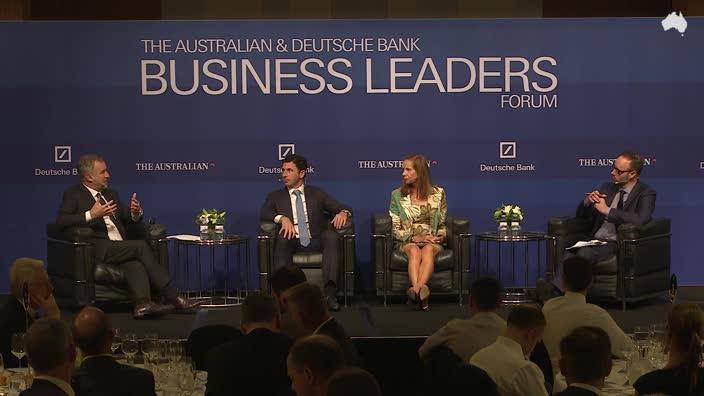Leaders push for fixed terms
Finance Minister Mathias Cormann has backed a call by business leaders for four-year parliamentary terms.

Federal Finance Minister Mathias Cormann has thrown his support behind a call by business leaders for four-year parliamentary terms to allow federal governments to make longer-term decisions.
Senator Cormann said he agreed with the chairman of the James Packer-backed Crown Resorts, Robert Rankin, who told The Australian and Deutsche Bank’s Business Leaders Forum in Perth that both sides of politics should put aside partisanship to consider reforming the current system.
“If you believe in long-term planning and transition, three-year terms in the House of Representatives is challenging,’’ Mr Rankin said at the forum yesterday. “There should be a real call to arms on both sides of politics in the national interest to give a bit more time so the cycles are longer and the planning is longer-term and not just rely on currency adjustments that provide (only) a short-term shock absorber.’’
After the forum, which debated the need for reform and the diversification of the West Australian economy, Senator Cormann said a change to parliamentary terms would be logistically difficult but worthwhile.
He believed a future federal government would turn its attention to four-year terms.
All of Australia’s state governments, apart from Queensland, have fixed four-year terms, although Queensland is planning to hold a referendum on the issue this month.
“I think that four-year terms would be a good idea but the current provision for three-year terms is part of our constitution (and) would require changing (by) referendum, which would mean it would require majority support of the majority of states,” Senator Cormann said.
“At some point that is something I am sure Australia will revisit but at this stage there are a whole lot of other things that we have to deal with first.”
Seven Group Holdings chief executive Ryan Stokes backed the Turnbull government’s Senate reform plan, but added that he was unsure about four-year terms for the sake of the company’s media assets.
“Three or four-year terms, I’m not sure,” he said. “I don’t mind three-year terms because it’s nice to get the advertising kick every three years.”
NBN and Perth Airport director Shirley In’t Veld, also speaking at the Business Leaders Forum, supported four-year terms in the lower house of federal parliament.
“It is the same as corporate Australia where the focus is on short termism and it really doesn’t auger well for growth,’’ she said.
The forum at Crown Perth debated the future of the West Australian economy after the resources boom and how the state can capitalise on its recent success to gain a more competitive advantage with Asia.
Following sharp falls in key commodities such as iron ore and oil over the past two years, the state economy has been hit by widespread job cuts as well as a major pullback in private sector investment. There has been a glimmer of hope among mining in recent days as the price of iron ore — the nation’s biggest export — has climbed back above $US60 a tonne.
Even so, Mr Rankin talked up a broader future for the WA economy, stressing that the transition of the state’s economy from its dependence on mining needed to be seen in a 10 to 20-year context.
“Transitions don’t occur on a 90-day quarterly basis,” Mr Rankin said. “Australia is incredibly grateful for the role WA has played in the national economy for the last 20 years.
“Just as the investments that are contributing now have taken a long, long time, I think the transition the economy is going through needs to be seen in the context of a generational transition, not a quarterly transition.
“If you look at that transition over a 25-year period … you are going to have China as the biggest economy in the world and will continue to be the biggest trading partner of this state. It’s already brought 600 million people out of poverty and there’s another couple of hundred million to come.
“You’re going to have India, which 30 years ago had the same GDP per capita as China,” Mr Rankin added. “India, in 25 years time, will be the third-biggest economy in the world. It’s currently ninth. Indonesia, currently the 14th, will be the fourth-biggest economy in the world”.
“The West Australian transition needs to be seen in the context of what’s going to be happening in the immediate region. I think that transition, where three of the four biggest economies in the world will be most proximate to this state, brings enormous opportunities and the investment and the transition needs to be seen in that context.”
But Mr Rankin said Perth needed to be at the centre of the transition. “This great city of Perth needs to be activated as a great gateway city,” he said.
Mr Stokes told the forum there was a “huge opportunity” in the state’s transition and the base of the WA economy remained strong despite the current downturn in commodity prices.
Ms In’t Veld said WA had a unique opportunity to scale up agribusiness, tourism and education. “It really is quite staggering what we’ve already got under way in agribusiness, whether its avocados down at Manjimup or barramundi up in the Kimberley of rock lobsters being exported to China from Geraldton,” she said.
“The beef and milk industry, the Chinese are already investing in Capel in the southwest and milk is being air-freighted to China and sold for $10 a litre.
“There’s a fantastic opportunity to scale this up given the shift in economic power from west to the east and the industrialisation of China.”
Additional reporting: Paul Garvey



To join the conversation, please log in. Don't have an account? Register
Join the conversation, you are commenting as Logout